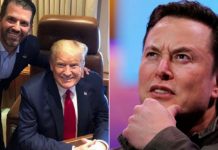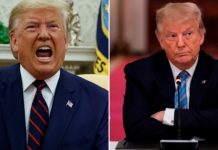
President Trump made good on his threat to ban TikTok on Thursday, issuing an executive order that will bar the wildly popular video app‘s parent company, ByteDance, from conducting business transactions with other American companies beginning in 45 days.
A separate order bans business transactions involving WeChat, a popular communications and commerce app owned by the Chinese internet giant Tencent.

The orders come after the Trump administration deemed apps from Chinese software companies national security threats, warning that they could put American data in danger.
“This data collection threatens to allow the Chinese Communist Party access to Americans’ personal and proprietary information — potentially allowing China to track the locations of federal employees and contractors, build dossiers of personal information for blackmail, and conduct corporate espionage,” reads the text of the TikTok order.
TikTok has said it has not and will not give information to the Chinese government. TikTok said its U.S. user information is stored in the U.S. and backed up in Singapore.
The executive order is a blow to TikTok, which has achieved massive global growth as people looked for ways to be entertained at home during the COVID-19 pandemic. Music artists have used TikTok to promote their songs; talent agencies check out the videos for rising talent, and young video creators in L.A. have made tens of thousands of dollars each month through brand deals on TikTok.
TikTok is in the process of exploring a deal to sell its U.S. operations to Microsoft. Trump has said he is open to such a deal as long as some of the proceeds go to the U.S. Treasury, a condition that raises legal questions.
“There’s nothing specific that says you can do this,” said Will Delgado, a founding partner at DTO Law. “You do have a president that has a different type of mindset than kind of previous presidents and maybe it just hadn’t occurred to other presidents in the past.”
The purchaser who would have legal standing to challenge such a requirement, in this case, has already signalled it may not. Microsoft in a statement Sunday said it is “committed to acquiring TikTok subject to a complete security review and providing proper economic benefits to the United States, including the United States Treasury.”
But if such a deal goes through, it could deter similar acquisitions in the future.
“One wonders about the chilling effect at a very practical level of what might happen in a future transaction if somebody is fearful of having to pay such a fee and they don’t want to. Might that discourage a transaction from … even coming up?” Delgado said.
TikTok employs about 1,500 people in the U.S. and plans to add 10,000 more over the next three years. Its largest U.S. office is in Culver City. The company did not immediately respond to a request for comment.
In addition to WeChat, Tencent owns stakes in video game publishers including Riot Games, Epic Games and Activision Blizzard. But the language of the WeChat order specifies “any transaction that is related to WeChat by any person, or with respect to any property, subject to the jurisdiction of the United States, with Tencent Holdings Ltd.,” suggesting it was written to exclude transactions involving Tencent’s video game portfolio. Spokespersons for the White House did not immediately respond to an email seeking clarification.


































